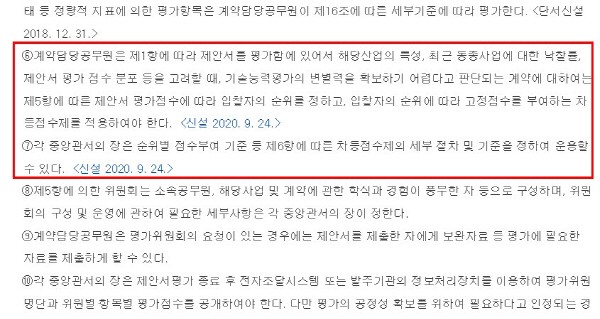Public Procurement Service, applied for the ordering of real model purchasing business
Resolve low-priced bids by widening the technology differential scoring system
Used for Daegu Meteorological Admi

It was confirmed that the differential scoring system, which puts a differential range on the technical points, was applied to the field of purchase of real models (exhibitions), and was effective in preventing cutthroat competition. Even in the field of software (SW), where there is no case yet, there are voices that it should be introduced quickly. According to the Public Procurement Service on the 7th, five or more organizations that placed an order for the 'real model (exhibition)' have selected or are in the process of bidding by applying a differential pointssystem. The first application project was ordered in March of this year, and the application is expected to increase in the future.
The differential scoring system is a system in which bidders are ranked based on proposal evaluation points, and fixed points are awarded according to the ranking. The purpose of the introduction is to prevent cutthroat competitioncaused by lowering price by widening the range of technical pointsdifferences in the negotiation-based contract method consisting of 'skill points + price points'.
The Daegu Regional Meteorological Administration gave 90 points in the bid for the 'Design, Production, and Installation of Exhibition and Experience Facilities in Exhibition Hall 3 of the National Daegu Meteorological Science Museum', with a pointsof 2.7 differential points according to the ranking. As a result, the first-ranked company with 90 technical points and 8.5 price points won the project ahead of the second-ranked company with 87.3 technicalpoints and 10 price points. According to the existing method, where the difference in technicalpointswas only two or three decimal places, the second-ranked company that lowered the price could be a successful bidder.
The National Science Museum of the Ministry of Science and ICT applied a 2.5-point differential pointto the technical points in the 'ChanguiNarae Hall exhibition remodeling design and production' project. The first-ranked company received 90 technical points and 9.988 price points, surpassing the second-ranked companies, which received 87.5 technical points and 10 price points. Taebeom Ahn, a researcher at the Gwacheon National Science Museum, said, “The exhibition field requires creative capabilities, but there was a negative result from a low-priced bid. We decided to apply this system when there was a guidance from the Public Procurement Service on the differential scoring system, and there was also an opinion from the industry asking for the differential scoring system to be applied when the pre-standards were announced.”

The differential scoring system was implemented at the end of last year as the Ministry of Strategy and Finance revised the 'Contract Standards by Negotiation (Contract Rules)'. Considering the characteristics of the industry, the successful bid rate of recent projects of the same industry, and the distribution of evaluation pointsfor proposals, if it is judged that it is difficult to secure a distinction in the evaluation of technical competence, a differential scoring system should be applied. Whether to apply or not is decided by each ordering organization.
In the SW field, it is often difficult to differentiate technological evaluation when companies above a certain level compete. It is common for the ranking to change depending on the price as the difference in technical points is set to the nearest decimal point. The expected effect of the differential scoring system is to prevent cutthroat competitionand allow companies with technological prowess to win project at an appropriate price. There is no application case in SW field yet. It is analyzed that the public SW project ordering organization is reluctant to reduce the price competition factor. The industry emphasizes the need to pay attention to the case of the Defense Acquisition Program Administration(DAPA)along with the mock-up (exhibition) field. The DAPA has independently applied the differential scoring system since 2006 to select products with technological prowess and secure profitability. Currently, there is a difference of 7.5 points between technicalgrades.
The Public Procurement Service revised the 'Detailed Standards for Evaluation of Contract Proposals by Negotiation' in July to spread the differential scoring system. It was specifically specified to keep the differential pointswithin three points, and if it was not desired to apply the differential pointsystem, it was requested to specify the relevant matter at the time of procurement request.
<Table> Results of the evaluation of the exhibition experience facility project in Exhibition Hall 3 of the Daegu National Meteorological Science Center (opened in April 2021)

By Staff Reporter Hocheon Ahn (hcan@etnews.com)